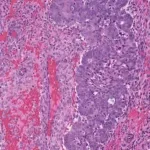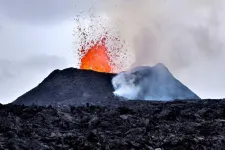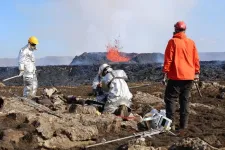(Press-News.org) A discovery by researchers at the University of British Columbia promises to improve care for patients with endometrial cancer, the most common gynecologic malignancy.
Using artificial intelligence (AI) to spot patterns across thousands of cancer cell images, the researchers have pinpointed a distinct subset of endometrial cancer that puts patients at much greater risk of recurrence and death, but would otherwise go unrecognized by traditional pathology and molecular diagnostics.
The findings, published today in Nature Communications, will help doctors identify patients with high-risk disease who could benefit from more comprehensive treatment.
“Endometrial cancer is a diverse disease, with some patients much more likely to see their cancer return than others,” said Dr. Jessica McAlpine, professor and Dr. Chew Wei Chair in Gynaecologic Oncology at UBC, and surgeon-scientist at BC Cancer and Vancouver General Hospital. “It’s so important that patients with high-risk disease are identified so we can intervene and hopefully prevent recurrence. This AI-based approach will help ensure no patient misses an opportunity for potentially lifesaving interventions.”
AI-powered precision medicine
The discovery builds on work by Dr. McAlpine and colleagues at B.C.’s Gynecologic Cancer Initiative — a multi-institutional collaboration between UBC, BC Cancer, Vancouver Coastal Health and BC Women’s Hospital — who in 2013 helped show that endometrial cancer can be classified into four subtypes based on the molecular characteristics of cancerous cells, with each posing a different level of risk to patients.
Dr. McAlpine and team then went on to develop an innovative molecular diagnostic tool, called ProMiSE, that can accurately discern between the subtypes. The tool is now used across B.C., parts of Canada and internationally to guide treatment decisions.
Yet, challenges remain. The most prevalent molecular subtype, encompassing approximately 50 per cent of all cases, is largely a catch-all category for endometrial cancers lacking discernable molecular features.
“There are patients in this very large category who have extremely good outcomes, and others whose cancer outcomes are highly unfavourable. But until now, we have lacked the tools to identify those at-risk so that we can offer them appropriate treatment,” said Dr. McAlpine.
Dr. McAlpine turned to long-time collaborator and machine learning expert Dr. Ali Bashashati, an assistant professor of biomedical engineering and pathology and laboratory medicine at UBC, to try and further segment the category using advanced AI methods.
Dr. Bashashati and his team developed a deep learning AI model that analyzes images of tissue samples collected from patients. The AI was trained to differentiate between different subtypes, and after analyzing over 2,300 cancer tissue images, pinpointed the new subgroup that exhibited markedly inferior survival rates.
“The power of AI is that it can objectively look at large sets of images and identify patterns that elude human pathologists,” said Dr. Bashashati. “It’s finding the needle in the haystack. It tells us this group of cancers with these characteristics are the worst offenders and represent a higher risk for patients.”
Bringing the discovery to patients
The team is now exploring how the AI tool could be integrated into clinical practice alongside traditional molecular and pathology diagnostics, thanks to a grant from the Terry Fox Research Institute.
“The two work hand-in-hand, with AI providing an additional layer on top of the testing we’re already doing,” said Dr. McAlpine.
One benefit of the AI-based approach is that it’s cost-efficient and easy to deploy across geographies. The AI analyzes images that are routinely gathered by pathologists and healthcare providers, even at smaller hospital sites in rural and remote communities, and shared when seeking second opinions on a diagnosis.
The combined use of molecular and AI-based analysis could allow many patients to remain in their home communities for less intensive surgery, while ensuring those who need treatment at a larger cancer centre can do so.
“What is really compelling to us is the opportunity for greater equity and access,” said Dr. Bashashati. “The AI doesn’t care if you’re in a large urban centre or rural community, it would just be available, so our hope is that this could really transform how we diagnose and treat endometrial cancer for patients everywhere.”
Interview language(s): English
END
Scientists discover high-risk form of endometrial cancer — and how to test for it — using AI
2024-06-26
ELSE PRESS RELEASES FROM THIS DATE:
COSPAR welcomes launch of International Space Innovation Centre, Nicosia, Cyprus
2024-06-26
The COSPAR Panel on Innovative Solutions (PoIS) charter aims to bring state-of-the-art technology to address the hardest problems facing COSPAR researchers. PoIS first focused on predicting adverse events from solar activity and applying innovative technologies and sophisticated tools to atmospheric modelling of Mars, Earth, and Venus. This effort led to the creation of the Cyprus Space Research and Innovation Center (C-SpaRC), co-funded by the European Union (EU) in December 2023 as a new infrastructure with related research, with the cooperation of COSPAR. C-SpaRC is now under the auspices of COSPAR, and is designated the COSPAR International ...
Potential long-term volcanic activity on Iceland's Reykjanes Peninsula
2024-06-26
Given the volcanic activity on Iceland over the last three years, researchers from six universities anticipate recurring, moderately sized eruptions of similar style in the coming years to decades. They therefore stress the need for preparedness in view of the risks posed to local populations and critical infrastructure. Their study was recently published in the scientific journal Terra Nova.
“The study uses information from local earthquakes and geochemical data on the erupted magma through time to reveal the geological processes behind these recent Icelandic eruptions. A comparison of these eruptions with historical events provides strong evidence that Iceland will ...
Study finds innovative cuffless blood pressure device streamlines and enhances hypertension management
2024-06-26
A study led by a Brigham investigator evaluated a novel device that automatically measures blood pressure at the wrist, generating hundreds of readings within days that may help clinicians determine cardiovascular risk and improve hypertension care
High blood pressure, the leading risk factor for death worldwide, is present in one in every two adults. Only one-quarter of individuals with hypertension have their blood pressure under control, highlighting the need for innovative strategies for blood pressure management. A study led by an investigator from Brigham and Women’s ...
Iceland’s volcano eruptions may last decades, researchers find
2024-06-26
Iceland’s ongoing volcanic eruptions may continue on and off for years to decades, threatening the country’s most densely populated region and vital infrastructure, researchers predict from local earthquake and geochemical data.
The eruptions on the Reykjanes Peninsula have forced authorities to declare a state of emergency, with a series of eight eruptions having occurred since 2021. This southwestern region is home to 70 percent of the country’s population, its only international airport, and several geothermal power plants that supply ...
Research shows children and adolescents may be motivated to rectify gender and ethnicity biases in the classroom
2024-06-26
A new Child Development study by researchers at the University of Maryland, Furman University, Education Northwest and University of Hawaiʻi at Manoa in the United States, examined whether children think it’s unfair for a teacher to select students from only one gender or ethnic group for leadership duties.
Researchers learned that children and adolescents are not only aware of these situations, but they are also motivated to rectify these types of inequalities in the classroom. Understanding ...
Research shows maternal cell phone use may negatively impact infant language development
2024-06-26
Research suggests that phone use may have an effect on children’s speech input and language development. However, most of the prior work in this area examines parents and children in controlled laboratory experiments in public spaces and may not be representative of daily interactions between a child and their caregivers.
New research in Child Development by the University of Texas at Austin in the United States is the first to combine objective markers of speech (via audio recorders worn by infants) and maternal cell phone use from cell phone logs. This research helps document ...
Is it time to stop recommending strict salt restriction in people with heart failure?
2024-06-26
For decades, it’s been thought that people with heart failure should drastically reduce their dietary salt intake, but some studies have suggested that salt restriction could be harmful for these patients. A recent review in the European Journal of Clinical Investigation that assessed all relevant studies published between 2000 and 2023 has concluded that there is no proven clinical benefit to this strategy for patients with heart failure.
Most relevant randomized trials were small, and a single large, ...
Should Iceland expect continued volcanic eruptions?
2024-06-26
Research published in Terra Nova provides insights into the ongoing eruption series on the Reykjanes Peninsula in Iceland that began in 2021. The eruptions forced the evacuation of an entire town, with an uncertain future about the possibility for residents to return.
For the study, investigators analyzed information from local earthquakes and geochemical data on lava samples erupted through time. The combined evidence implies that the lavas that have erupted in recent years were derived from a moderately-sized magma reservoir ...
Which adolescents are at risk of depression following early social media use?
2024-06-26
A new study that looked for relationships between early social media use and depression across adolescence and into young adulthood found that certain factors may make social media more risky or protective regarding depression. The findings, which are published in the Journal of Adolescence, suggest that social media use does not impact all adolescents in the same way, and an individualized approach is needed to determine the benefits and harms of social media on young people’s mental health.
For the study, 488 adolescents living in the United States were surveyed once a year for 8 years ...
New guidance available for peanut desensitization therapy in patients with peanut allergy
2024-06-26
Based on focus groups with children and young people with peanut allergy, experts have published guidance for clinicians working in the UK’s National Health Service (NHS) to help them safely and equitably implement Palforzia® peanut oral immunotherapy. Their recommendations are published in Clinical & Experimental Allergy.
In 2022, the National Institute for Health and Care Excellence in the UK recommended the use of Palforzia®—which has defatted peanut powder as its active ingredient—for desensitizing children ...





